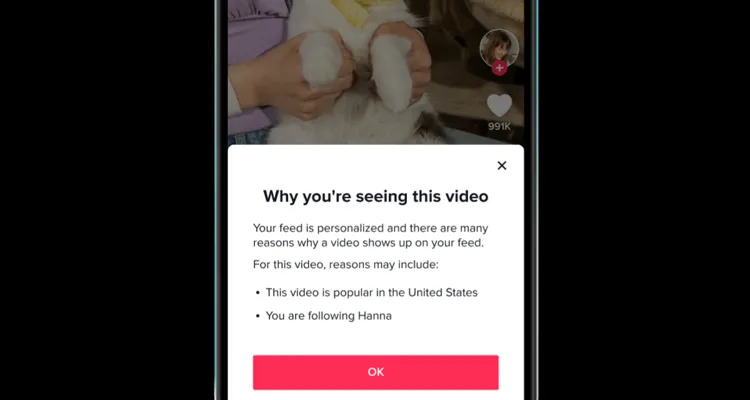Photo Credit: TikTok
TikTok suddenly offers transparency and insight into its recommendation algorithms amid state officials banning the app from government devices.
In a new blog post, TikTok suddenly offers some transparency and insight into its recommendation algorithms — after numerous states have already banned the platform across government devices and networks.
“Our system recommends content by ranking videos based on a combination of factors based on your activity on our app, which includes adjusting for things you indicate you’re not interested in,” TikTok explains. “Our recommendation system is powered by technical models, so we tried to make the technical details more easily understandable.”
To understand why a particular video has been recommended on TikTok, tap the share panel in your For You feed. Then, tap the question mark icon that reads, “Why this video?” From there, you’ll be given reasons why your feed recommended a particular video to you: user interactions, including watched content, likes, shares, comments you’ve posted, searches, accounts you follow, suggested accounts, or content that’s popular or recently posted in your region.
“This feature is one of many ways we’re working to bring meaningful transparency to the people who use our platform, and builds on a number of steps we’ve taken towards that goal,” says TikTok. “Looking ahead, we’ll continue to expand this feature to bring more granularity and transparency to content recommendations.”
While this change offers some much-welcomed transparency for users as to why they’re recommended the content they are, it does little to assuage privacy concerns surrounding the platform and its Chinese parent company, ByteDance.
The US Senate recently approved a bill that would ban TikTok on devices used by federal agencies. At the same time, several state governors have issued their own bans on the platform across government devices. States that have banned TikTok in some form include Alabama, Georgia, Idaho, Maryland, Nebraska, North Dakota, South Dakota, South Carolina, Texas, and Utah.
FBI Director Christopher Wray has also raised concerns with lawmakers that the app could be used for cyberattacks. Additionally, several US military branches have banned the app, including the Navy, Air Force, and Army.

